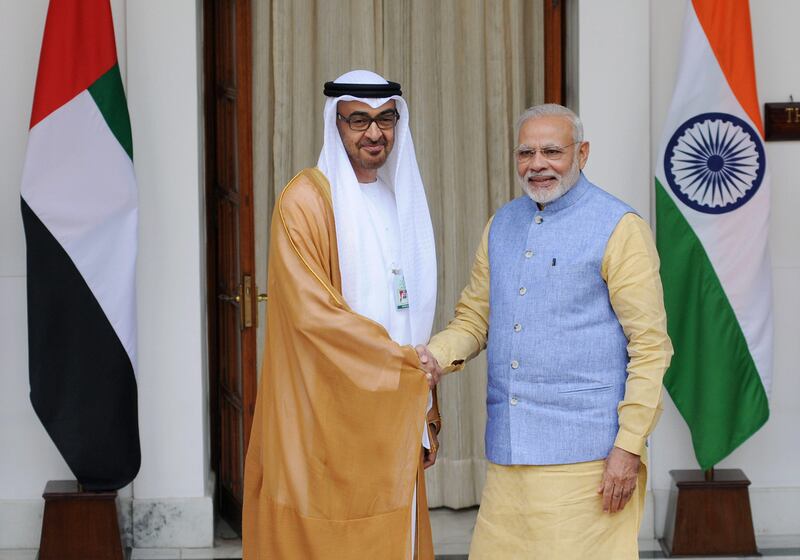NEW DELHI // India on Wednesday signed a raft of MoUs and a couple of agreements with the UAE that include a deal between state-owned Indian Strategic Petroleum Reserves Limited and the Abu Dhabi National Oil Company (Adnoc) on oil storage and management.
“This agreement aims to establish a framework for the storage of crude oil by Abu Dhabi National Oil Company in India and to further strengthen the strategic relationship between the two countries in the field of energy,” the Indian government said following delegation level talks between prime minister Narendra Modi and Sheikh Mohammed bin Zayed Al Nahyan, Crown Prince of Abu Dhabi and Deputy Supreme Commander of the UAE Armed Forces.
Financial terms of the deal were not disclosed and it was not immediately clear when Adnoc would start storing the oil in India.
Sheikh Mohammed is in India on a three-day state visit and is the chief guest at its Republic Day celebrations scheduled between January 24-26.
The UAE is India’s fifth-largest crude oil supplier.
India, hedging against energy security risks as it imports most of its oil needs, is building emergency storage in underground caverns to hold 36.87 million barrels of crude, or about 10 days of its average daily oil demand in 2016.
“Our energy partnership is an important bridge in our linkages. It contributes to our energy security. We also exchanged views on developments in West Asia and the Gulf, where both countries have a shared interest in peace and stability. We also discussed developments in our region, including Afghanistan. Our shared concern on growing threat from radicalism and terrorism to the safety and security of our people is shaping our cooperation in this space,” said Mr Modi, after the conclusion of delegation-level talks.
An agreement on comprehensive strategic partnership between India and the UAE was also signed on Wednesday.
“This is a general framework agreement which highlights the areas of bilateral cooperation identified under the comprehensive strategic partnership as agreed upon in the high level joint statements issued in August 2015 and February 2016,” the Indian government said. It didn’t elaborate.
On Wednesday several MoUs were alsxo signed by both countries, which included cooperation in the areas of defence manufacturing and technology, maritime transport, freight logistics, warehousing, prevention and combating of human trafficking, small and medium enterprises, agriculture, cyberspace and in the adoption of trade remedial measures in areas of mutual interest.
“Our discussions were wide ranging covering the entire spectrum of our bilateral engagement. The UAE is one of our most valued partners and a close friend in an important region of the world. We particularly focused on implementation of various decisions taken during our last two meetings. We agreed to sustain the momentum of our relations in key areas, including energy and investments,” said Mr Modi.
He added: “We regard UAE as an important partner in India’s growth story. I particularly welcome UAE’s interest in investing in India’s infrastructure sector. We are working to connect the institutional investors in UAE with our National Investment and Infrastructure Fund. I also shared with His Highness the interest of Indian companies to be a partner in infrastructure projects for the World Expo 2020 in Dubai. UAE can benefit by linking with our growth in manufacturing and services.”
Mr Modi also said India and the UAE can jointly tap abundant opportunities in initiatives aimed at building digital economy, human capital and smart urbanisation in India.
This is Sheikh Mohammed’s second state visit to India in less than a year. Earlier on Wednesday morning, Sheikh Mohammed who arrived in the capital on Tuesday evening, was accorded a guard of honour at the Presidential Palace.
A UAE military contingent will march in the Republic Day parade which is to be held Thursday. Sheikh Mohammed will be present during the morning parade as the chief guest.
Sheikh Mohammed is the most prominent Arab leader to be invited to be the chief guest at India’s Republic Day celebrations in recent years. The late Saudi King Abdullah bin Abdulaziz Al Saud had been the chief guest in 2006.
business@thenational.ae
Follow The National's Business section on Twitter





